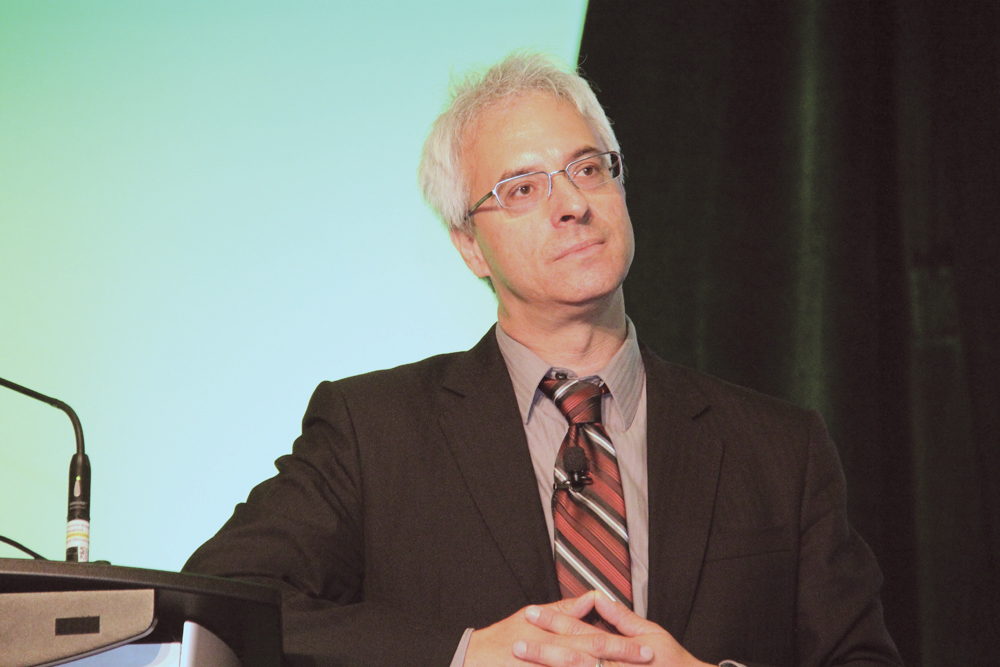Scott Streiner is a name railway executives instantly recognize, but not most farmers… yet.
That will change as the relatively new president and CEO of the Canadian Transportation Agency (CTA) continues to reach out to Canada’s agricultural sector, as he did on July 7 at the Pulse and Special Crops Convention.
“The agency is here to serve,” said Streiner, who before being appointed a year ago served as assistant deputy minister of policy at Transport Canada and before that was secretary to the Cabinet Committee on Economic Prosperity, preparing advice for the Prime Minister.
Read Also

Mazergroup’s Bob Mazer dies
Mazergroup’s Bob Mazer, who helped grow his family’s company into a string of farm equipment dealerships and the main dealer for New Holland machinery in Saskatchewan and Manitoba, died July 6 from cancer.
“We are a public body. We are open for business. And we are committed to doing our job in a way that is impartial, evidence-based, innovative and engaged.
“I invite you to engage with the agency on any matters of concern to you that relate to your relationship with the national transportation system and the services it provides.”
The CTA, originally known as the Board of Railway Commissioners, was created in 1904 and is Canada’s oldest independent tribunal and regulator. It operates at arm’s length from the federal government, administering the Canada Transportation Act, which is intended to keep Canada’s transportation system — rail, marine and air — running efficiently and smoothly.
Grain transportation has been contentious since the Canadian Pacific Railway (CP) completed the transcontinental railway in 1885. Farmers and grain companies complain they are captive to CP and Canadian National (CN) and as result often get poor service. The railways counter the complaints are exaggerated.
A huge backlog of grain shipping in 2013-14 prompted the former Harper government to take radical measures, including ordering the railways to move prescribed amounts of grain or be fined.
Grain has moved well this crop year (2015-16), but according to some farm groups and grain companies, it’s only because other traffic, such as oil, coal and potash has declined, freeing up capacity.
Mediation process
Farmers and grain companies are demanding a more permanent fix, including that the railways be subject to commercial penalties when they fail to provide the service they’ve promised.
Grain shippers are penalized by the railways if they fail to load or unload cars during a set time.
Under the current act, grain shippers can launch a formal level of service complaint against a railway, which the Canadian Transportation Agency will adjudicate through a quasi-judicial process. It doesn’t happen often because the process takes so long, is costly and some shippers fear it could hurt their relationship with the railway, Streiner said.
However, he added CTA offers informal mediation, which was beefed up during a reorganization of the CTA completed April 1. A special team has been set up within the CTA’s mediation branch to resolve disputes between railways and shippers. To ensure mediators are knowledgeable, they will be sent on a Western tour this year to visit railway and grain-handling facilities, Streiner told reporters later.
The CTA hasn’t done a lot of informal mediations either. Streiner isn’t sure why, but said it could be a lack of awareness. The process requires both shippers and the railways agree to the process, which can’t go on more than 30 days.
While CTA mediators cannot impose a resolution, it’s amazing what can be accomplished through the process, Streiner said.
In the meantime, Transport Minister Marc Garneau has the Emerson report on possible changes to the transportation act, which shippers complain failed to recommend the level of railway accountability they want.
Garneau is also consulting the industry. The CTA will provide Garneau with whatever information and analysis that can help him, Streiner said.
What’s working
The CTA also has some observations on what’s working and not working in the act and what’s lacking so the CTA can do its job, he added.
The industry has recommended the CTA be able to initiate inquiries without a formal complaint and make general orders when systemic problems are found and to collect and collect and disseminate more data, which Streiner said is “worthy of consideration.”
Meanwhile, the CTA is reviewing all nine of the regulations it’s responsible for, to ensure they are up-to-date.
“All of it is open for discussion,” Streiner said.
The review will have four phases of consultation covering various topics. The final one will be rail issues, to start late this year or early next year, Streiner said.
“Our intention is to complete consultations and the drafting of new regulations by the end of 2017 and to be finalizing approvals and moving into implementation in 2018,” he said. ‘It is an ambitious schedule for regulatory change, But in my view a feasible one.”




















